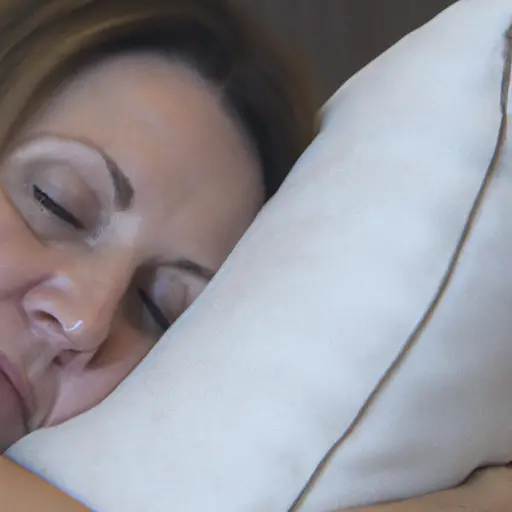If you suffer from allergies, you know how important it is to minimize your exposure to allergens. One common source of allergens in the bedroom is your mattress.
Dust mites, pet dander, and other allergens can accumulate in your mattress over time, triggering allergy symptoms. Fortunately, there is a solution: mattress covers designed specifically for allergy sufferers.
These covers create a barrier between you and the allergens in your mattress, preventing them from coming into contact with your skin or being inhaled while you sleep.
They are typically made from tightly woven fabrics or materials like vinyl or polyurethane that are impermeable to allergens. Some covers even have a zippered closure that completely encases your mattress for maximum protection.
When shopping for a mattress cover for allergies, there are a few things to keep in mind. Look for a cover that is specifically designed for allergy sufferers and is labeled as hypoallergenic.
Make sure it is easy to clean and maintain, as regular washing is necessary to keep allergens at bay. Additionally, consider the size and fit of the cover to ensure it will properly cover your entire mattress. With the right mattress cover, you can enjoy a good night’s sleep without worrying about allergy symptoms.
Table of Contents
Understanding Allergies
Allergies are a common condition that affects millions of people worldwide. Allergies occur when your immune system reacts to a substance that is usually harmless, such as pollen, dust mites, or pet dander. Allergies can cause a range of symptoms, from mild to severe, and can interfere with your daily life.
Common Allergens
There are many different allergens that can trigger an allergic reaction. Some of the most common allergens include:
- Dust mites: These tiny creatures are found in bedding, carpets, and upholstered furniture.
- Pollen: Pollen is a fine powder produced by plants during the spring and summer months.
- Pet dander: This is the dead skin cells and hair that pets shed.
- Mold: Mold is a type of fungus that grows in damp environments.
Impact on Sleep
Allergies can have a significant impact on your sleep quality. When you are exposed to an allergen, your body produces histamine, which can cause swelling, inflammation, and irritation in your nasal passages and airways. This can make it difficult to breathe, leading to snoring, coughing, and other sleep disturbances.
Additionally, allergies can cause itchiness, sneezing, and a runny nose, which can make it difficult to fall asleep and stay asleep. Over time, this can lead to chronic sleep deprivation, which can have a range of negative health consequences.
If you suffer from allergies, it is important to take steps to minimize your exposure to allergens. One way to do this is by using a hypoallergenic mattress cover, which can help to keep dust mites, pet dander, and other allergens out of your bed.
By reducing your exposure to allergens, you can improve your sleep quality and enjoy a more restful night’s sleep.
Importance of Mattress Covers for Allergy Sufferers
If you suffer from allergies, then you know how difficult it can be to get a good night’s sleep. Allergens such as dust mites, pet dander, and pollen can cause symptoms like sneezing, coughing, and itchy eyes that make it hard to rest comfortably.
One solution to this problem is to use a mattress cover designed specifically for allergy sufferers.
Barrier Against Allergens
A mattress cover creates a barrier between you and the allergens that can cause discomfort and disrupt your sleep. These covers are made from materials that are tightly woven and prevent allergens from penetrating the surface. They also have a zipper closure that seals the mattress completely, preventing any allergens from getting inside.
When you use a mattress cover, you can rest easy knowing that you are protected from allergens that can cause discomfort and disrupt your sleep. This can be especially important for those who suffer from allergies that are triggered by dust mites, as these microscopic creatures can live in mattresses and bedding and cause significant discomfort.
Improvement in Sleep Quality
In addition to protecting you from allergens, a mattress cover can also improve the quality of your sleep. When you are not constantly sneezing, coughing, or rubbing your eyes, you can rest more comfortably and wake up feeling refreshed.
A mattress cover can also help regulate your body temperature, which can be especially important for those who suffer from allergies that are triggered by heat or cold. By keeping you at a comfortable temperature throughout the night, a mattress cover can help you sleep more soundly and wake up feeling rested.
Types of Mattress Covers
If you suffer from allergies, a mattress cover can help protect you from allergens that can cause discomfort and irritation. Mattress covers come in a variety of materials, sizes, and designs, so it’s important to choose the right one for your needs.
Materials Used
Mattress covers can be made from a variety of materials, including cotton, polyester, vinyl, and more. Here are some of the most common materials used in mattress covers and their benefits:
- Cotton: Cotton is a natural, breathable material that is soft and comfortable. It is also hypoallergenic and can help prevent dust mites and other allergens from settling in your mattress.
- Polyester: Polyester is a synthetic material that is lightweight and durable. It is also hypoallergenic and can help protect against allergens.
- Vinyl: Vinyl is a synthetic material that is waterproof and can provide extra protection against spills and stains. However, it can be less breathable than other materials and may not be as comfortable to sleep on.
Size and Fit
When choosing a mattress cover, it’s important to make sure it fits your mattress properly. Most mattress covers come in standard sizes, such as twin, full, queen, and king, but it’s important to measure your mattress to ensure a proper fit. A well-fitting mattress cover can help prevent allergens from getting into your mattress and can also help keep the cover in place while you sleep.
Ease of Cleaning
Mattress covers should be easy to clean and maintain to ensure they continue to provide protection against allergens. Look for covers that are machine washable and can be dried on low heat. Some covers may also be waterproof or stain-resistant, which can make them even easier to clean and maintain.
Overall, choosing the right mattress cover can help protect you from allergens and provide a more comfortable and restful night’s sleep. Consider your specific needs and preferences when choosing a cover, and be sure to read product reviews and specifications to ensure you’re getting a high-quality and effective product.
Choosing the Right Mattress Cover
When it comes to choosing the right mattress cover for allergy sufferers, there are a few things to consider. In this section, we’ll cover some of the most important factors to keep in mind when selecting a mattress cover.
Consider Your Allergy Type
Before you start shopping for a mattress cover, it’s important to consider the type of allergies you have. If you’re allergic to dust mites, for example, you’ll want to look for a cover that is specifically designed to block these tiny pests.
On the other hand, if you’re allergic to pet dander, you’ll want to look for a cover that is made from materials that are resistant to pet hair and other allergens.
Budget Considerations
Another important factor to consider when choosing a mattress cover is your budget. While it’s true that some of the best covers can be quite expensive, there are also plenty of affordable options available.
In general, you can expect to pay anywhere from $20 to $200 for a high-quality mattress cover. Keep in mind that a higher price tag doesn’t always mean better quality, so be sure to read reviews and compare features before making a purchase.
Comfort and Sleep Preferences
Finally, it’s important to consider your own comfort and sleep preferences when choosing a mattress cover. Some covers are designed to be more breathable and cooling, while others offer extra padding and support. Think about what you need to get a good night’s sleep, and look for a cover that meets those requirements.
Here are a few additional tips to keep in mind when choosing a mattress cover:
- Look for covers that are easy to clean and maintain.
- Consider the size and thickness of your mattress when choosing a cover.
- Be sure to measure your mattress before making a purchase to ensure a proper fit.
Care and Maintenance of Mattress Covers
To ensure that your allergy mattress cover lasts for a long time and continues to provide protection against allergens, proper care and maintenance are essential. Here are some tips to help you take care of your mattress cover:
Washing and Drying
Most allergy mattress covers are machine washable. However, it is important to check the care instructions on the label before washing. Some covers may require special care, such as washing in cold water or using a specific type of detergent.
When washing your mattress cover, it is recommended to use a gentle cycle with a mild detergent. Avoid using bleach or fabric softeners, as they can damage the cover and reduce its effectiveness.
After washing, tumble dry the cover on low heat or air dry it. High heat can damage the cover and reduce its effectiveness in protecting against allergens.
Regular Cleaning
In addition to washing your mattress cover, it is important to regularly clean it to remove any dust or debris that may have accumulated on the surface. You can use a vacuum cleaner with a soft brush attachment to gently clean the cover.
Avoid using harsh chemicals or abrasive cleaners, as they can damage the cover and reduce its effectiveness.
Replacement
Over time, your mattress cover may become worn or damaged, reducing its effectiveness in protecting against allergens. It is recommended to replace your mattress cover every 1-2 years or as recommended by the manufacturer.
By following these simple care and maintenance tips, you can ensure that your allergy mattress cover continues to provide effective protection against allergens, allowing you to get a good night’s sleep without worrying about allergies.
Frequently Asked Questions
Are mattress protectors effective for allergy sufferers?
Yes, mattress protectors can be very effective for allergy sufferers. They work by creating a barrier between you and your mattress, preventing allergens such as dust mites, pollen, and pet dander from getting into your bedding and causing allergic reactions.
However, it’s important to choose a high-quality mattress protector that is specifically designed to block allergens.
What are the top-rated anti-allergy mattress covers?
There are many great anti-allergy mattress covers on the market, but some of the top-rated options include the AllerEase Ultimate Protection and Comfort Zippered Mattress Protector, the SafeRest Premium Hypoallergenic Waterproof Mattress Protector, and the PlushDeluxe Premium Bamboo Mattress Protector.
Do dust mite mattress covers actually work?
Yes, dust mite mattress covers can be very effective in reducing dust mite allergies. They work by creating a barrier between you and the dust mites, preventing them from getting into your bedding and causing allergic reactions.
However, it’s important to choose a high-quality dust mite mattress cover that is specifically designed to block dust mites.
What is the best type of mattress cover for allergy sufferers?
The best type of mattress cover for allergy sufferers is one that is specifically designed to block allergens such as dust mites, pollen, and pet dander. Look for covers that are made from hypoallergenic materials and have a tight weave to prevent allergens from getting through.
Where can I find high-quality mattress covers for allergies?
You can find high-quality mattress covers for allergies at many bedding and home goods stores, as well as online retailers such as Amazon. Look for covers that are specifically designed to block allergens and have high customer ratings and reviews.
Can a mattress protector help with allergy-related sleep issues?
Yes, a mattress protector can help with allergy-related sleep issues by creating a barrier between you and the allergens that can cause allergic reactions. By reducing your exposure to these allergens, you may experience fewer symptoms and be able to get a better night’s sleep. However, it’s important to choose a high-quality mattress protector that is specifically designed to block allergens.
Final Thoughts
In conclusion, finding the right mattress cover is essential for allergy sufferers to get a good night’s sleep. Here are some key takeaways to keep in mind when selecting a mattress cover:
- Look for hypoallergenic materials such as cotton, bamboo, or microfiber to prevent the accumulation of dust mites and other allergens.
- Consider the type of mattress cover that will work best for your needs. Encasements are great for those with severe allergies, while mattress pads and toppers can add extra comfort to your bed.
- Make sure the mattress cover is easy to clean and maintain. Look for covers that are machine washable and dryer friendly.
- Don’t forget to check the size of the mattress cover to ensure it fits your bed properly.
Remember, a good mattress cover can make a significant difference in reducing allergy symptoms and improving your sleep quality. With the right information and consideration, you can find the perfect mattress cover to suit your needs.



